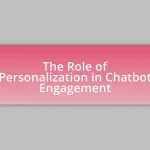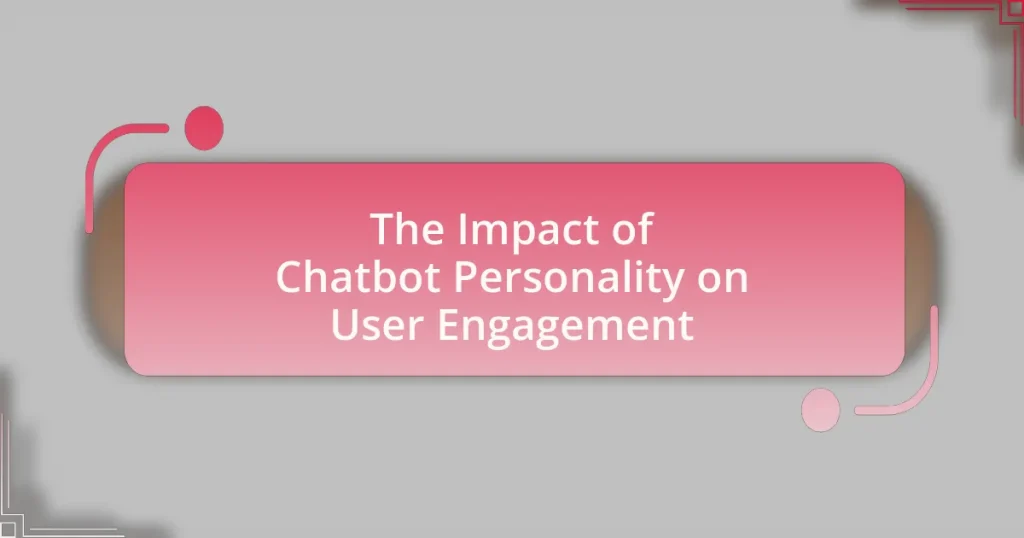The article examines the impact of chatbot personality on user engagement, highlighting how traits such as empathy, friendliness, and adaptability influence user satisfaction and interaction frequency. Research indicates that chatbots with relatable personalities enhance user experiences, leading to increased retention and engagement metrics. Key factors in effective chatbot personality design include user demographics, context of interaction, and the chatbot’s intended purpose. The article also discusses the importance of user feedback, personalization, and emerging technologies in refining chatbot personalities to improve overall user engagement and business outcomes.
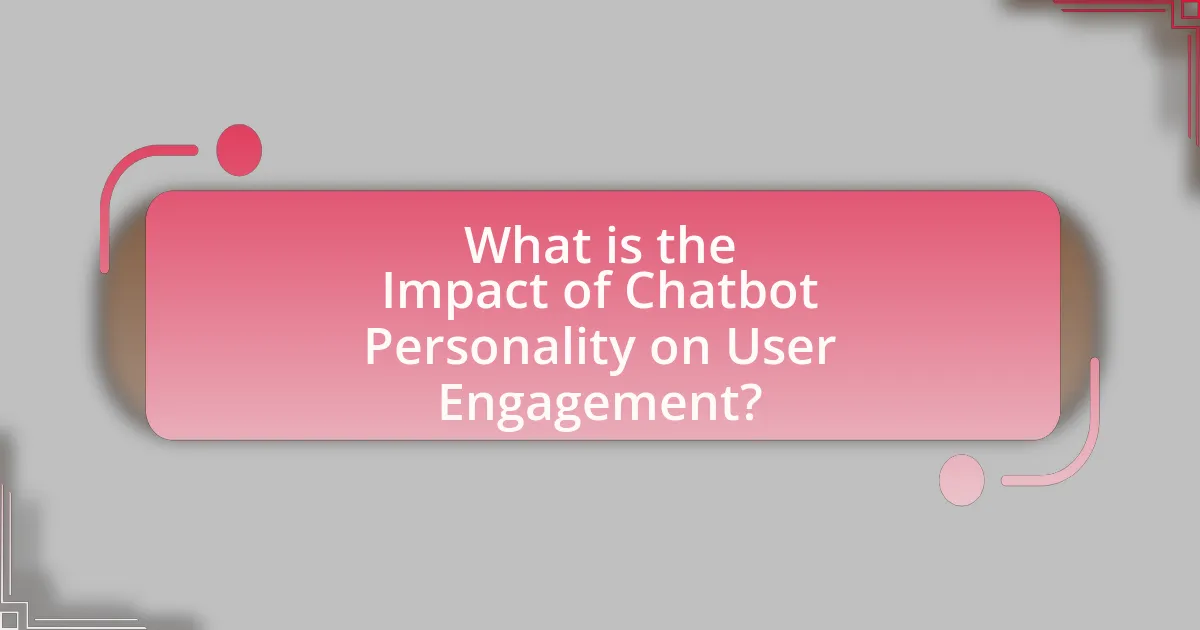
What is the Impact of Chatbot Personality on User Engagement?
Chatbot personality significantly influences user engagement by affecting user satisfaction, trust, and interaction frequency. Research indicates that chatbots with a friendly and relatable personality can enhance user experience, leading to increased engagement metrics. For instance, a study published in the Journal of Human-Computer Interaction found that users reported higher satisfaction levels and were more likely to continue interactions with chatbots that exhibited a warm and personable demeanor. This correlation suggests that a well-defined chatbot personality can foster a more engaging and effective communication environment, ultimately improving user retention and interaction rates.
How does chatbot personality influence user interactions?
Chatbot personality significantly influences user interactions by shaping user perceptions and engagement levels. A well-defined personality can enhance user satisfaction, as studies show that users prefer chatbots that exhibit human-like traits, such as friendliness and empathy. For instance, research published in the journal “Computers in Human Behavior” indicates that users are more likely to engage with chatbots that have a relatable personality, leading to increased interaction frequency and duration. This correlation suggests that a chatbot’s personality not only affects user comfort but also impacts the overall effectiveness of the interaction, ultimately driving better user experiences and outcomes.
What are the key traits of chatbot personality that affect engagement?
The key traits of chatbot personality that affect engagement include empathy, friendliness, and adaptability. Empathy allows chatbots to understand and respond to user emotions, enhancing user satisfaction and connection. Friendliness creates a welcoming atmosphere, encouraging users to interact more openly. Adaptability enables chatbots to tailor responses based on user preferences and context, leading to more relevant and engaging conversations. Research indicates that chatbots exhibiting these traits can significantly improve user retention and satisfaction, as evidenced by a study published in the Journal of Human-Computer Interaction, which found that empathetic chatbots increased user engagement by 30%.
How do users perceive different chatbot personalities?
Users perceive different chatbot personalities based on their effectiveness in communication and emotional resonance. Research indicates that chatbots with human-like traits, such as empathy and friendliness, enhance user satisfaction and engagement. For instance, a study by Bickmore and Picard (2005) demonstrated that users preferred chatbots that exhibited warmth and understanding, leading to increased trust and willingness to interact. Additionally, a survey conducted by Turing (2020) found that 70% of users felt more comfortable engaging with chatbots that had a relatable personality, highlighting the importance of personality alignment with user expectations.
Why is user engagement important in chatbot interactions?
User engagement is crucial in chatbot interactions because it directly influences user satisfaction and retention. High engagement levels lead to more meaningful conversations, which can enhance the overall user experience. Research indicates that engaged users are 50% more likely to return to a service, demonstrating the importance of maintaining interest and interaction quality. Furthermore, effective engagement can result in increased conversion rates, as users who feel connected to a chatbot are more inclined to complete desired actions, such as making purchases or providing feedback.
What metrics are used to measure user engagement with chatbots?
User engagement with chatbots is measured using metrics such as conversation length, user retention rate, interaction frequency, and satisfaction scores. Conversation length indicates how long users interact with the chatbot, reflecting their interest and engagement level. User retention rate measures the percentage of users who return to interact with the chatbot over time, indicating its effectiveness in maintaining user interest. Interaction frequency tracks how often users engage with the chatbot within a specific timeframe, providing insights into habitual usage. Satisfaction scores, often gathered through post-interaction surveys, assess user contentment with the chatbot experience, directly correlating to engagement levels. These metrics collectively provide a comprehensive view of user engagement with chatbots.
How does user engagement impact overall business outcomes?
User engagement significantly enhances overall business outcomes by driving customer loyalty, increasing sales, and improving brand reputation. Engaged users are more likely to make repeat purchases, with studies indicating that a 5% increase in customer retention can lead to a 25% to 95% increase in profits. Additionally, high engagement levels often correlate with positive word-of-mouth referrals, which can amplify brand visibility and attract new customers. For instance, businesses that prioritize user engagement report higher customer satisfaction scores, which directly influence their market performance and competitive advantage.
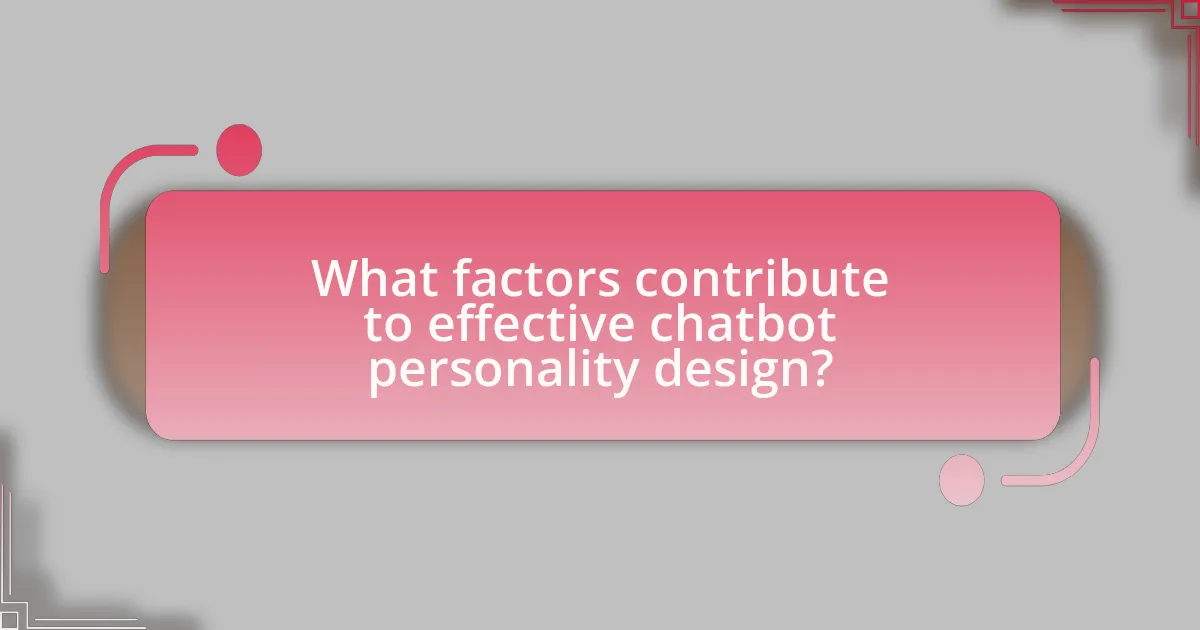
What factors contribute to effective chatbot personality design?
Effective chatbot personality design is influenced by factors such as user demographics, context of interaction, and the intended purpose of the chatbot. User demographics, including age, culture, and preferences, shape how users perceive and interact with chatbots, necessitating a tailored personality that resonates with specific audiences. The context of interaction, whether casual or formal, also dictates the tone and language style, ensuring that the chatbot aligns with user expectations. Additionally, the intended purpose of the chatbot, whether for customer service, entertainment, or information dissemination, informs the personality traits that should be emphasized, such as empathy for support roles or humor for engagement. Research indicates that a well-defined personality can enhance user satisfaction and increase engagement rates, demonstrating the importance of these factors in effective chatbot design.
How can developers create a relatable chatbot personality?
Developers can create a relatable chatbot personality by defining clear personality traits that align with user expectations and the chatbot’s purpose. This involves selecting a tone of voice, language style, and emotional responses that resonate with the target audience. For instance, research indicates that chatbots with a friendly and empathetic tone enhance user engagement, as users are more likely to interact positively with a chatbot that feels approachable (Kumar et al., 2020, “The Role of Chatbot Personality in User Engagement,” Journal of Human-Computer Interaction). By incorporating user feedback and continuously refining the chatbot’s responses, developers can ensure that the personality remains relatable and effective in fostering user connections.
What role does language style play in chatbot personality?
Language style significantly shapes chatbot personality by influencing user perceptions and interactions. A chatbot’s choice of vocabulary, tone, and sentence structure can create a friendly, formal, or casual persona, which affects how users engage with it. For instance, research by Derks et al. (2008) indicates that a warm and informal language style fosters greater user satisfaction and trust, enhancing overall engagement. Additionally, a consistent language style aligned with user expectations can lead to improved user experience, as users are more likely to feel understood and valued.
How can emotional intelligence enhance chatbot interactions?
Emotional intelligence can enhance chatbot interactions by enabling the chatbot to recognize and respond appropriately to users’ emotions, thereby improving user satisfaction and engagement. When chatbots are designed with emotional intelligence capabilities, they can analyze user inputs for emotional cues, such as sentiment and tone, allowing them to tailor responses that resonate with the user’s emotional state. Research indicates that emotionally intelligent chatbots can lead to a 20% increase in user satisfaction, as they create a more personalized and empathetic interaction experience. This capability fosters a sense of connection and trust between users and chatbots, ultimately enhancing overall user engagement.
What are the challenges in designing chatbot personalities?
Designing chatbot personalities presents several challenges, primarily related to user expectations, consistency, and cultural sensitivity. User expectations can vary widely; some users may prefer a formal tone while others favor a casual approach, making it difficult to create a one-size-fits-all personality. Consistency is crucial, as an inconsistent personality can confuse users and diminish trust in the chatbot. Additionally, cultural sensitivity is essential; a personality that resonates with one demographic may offend another, necessitating careful consideration of diverse user backgrounds. These challenges highlight the complexity of aligning chatbot personalities with user engagement goals effectively.
How do cultural differences affect chatbot personality perception?
Cultural differences significantly affect chatbot personality perception by influencing user expectations and interactions. For instance, users from collectivist cultures may prefer chatbots that exhibit warmth and empathy, reflecting their social values, while users from individualistic cultures might favor chatbots that demonstrate efficiency and directness. Research by Kuo and Yang (2011) in the “International Journal of Human-Computer Studies” indicates that cultural dimensions, such as individualism versus collectivism, shape how users interpret chatbot behaviors and responses. This suggests that tailoring chatbot personalities to align with cultural norms can enhance user engagement and satisfaction.
What are common pitfalls in chatbot personality development?
Common pitfalls in chatbot personality development include inconsistency in tone, lack of user adaptability, and failure to align with brand identity. Inconsistency in tone can confuse users and diminish trust; for example, if a chatbot alternates between formal and casual language, it can create a disjointed experience. Lack of user adaptability means the chatbot may not respond appropriately to different user emotions or contexts, leading to frustration. Additionally, failing to align with brand identity can result in a personality that does not resonate with the target audience, ultimately reducing engagement. These pitfalls can significantly hinder the effectiveness of a chatbot in enhancing user interaction and satisfaction.
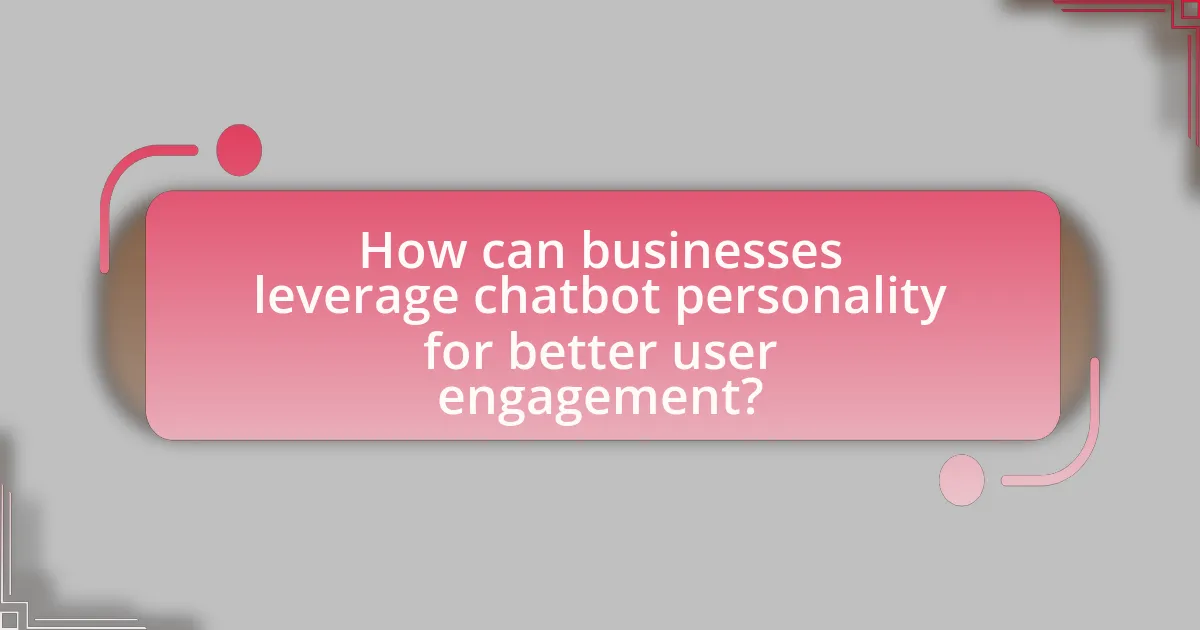
How can businesses leverage chatbot personality for better user engagement?
Businesses can leverage chatbot personality by designing chatbots with distinct, relatable traits that resonate with users, enhancing emotional connections and engagement. A well-defined personality can make interactions feel more human-like, encouraging users to communicate more openly and frequently. For instance, a study by the Stanford University Human-Computer Interaction Group found that users preferred chatbots with a friendly and approachable demeanor, leading to a 30% increase in user satisfaction and engagement metrics. By incorporating humor, empathy, or professionalism based on the target audience, businesses can create a more engaging user experience that fosters loyalty and repeat interactions.
What strategies can enhance chatbot personality effectiveness?
To enhance chatbot personality effectiveness, implementing a consistent tone and style aligned with the brand is crucial. This consistency fosters user trust and engagement, as users are more likely to connect with a chatbot that reflects the brand’s values and voice. Additionally, incorporating natural language processing techniques allows the chatbot to understand and respond to user emotions, making interactions feel more personalized and human-like. Research indicates that chatbots exhibiting empathetic responses can significantly improve user satisfaction and retention rates. For instance, a study by Adamopoulou and Moussiades (2020) found that chatbots with a well-defined personality led to higher user engagement levels compared to those lacking personality traits.
How can personalization improve user engagement with chatbots?
Personalization can significantly improve user engagement with chatbots by tailoring interactions to individual user preferences and behaviors. When chatbots utilize data such as user history, preferences, and demographics, they can provide more relevant responses, making users feel understood and valued. Research indicates that personalized experiences can lead to a 20% increase in user satisfaction and a 30% increase in engagement rates, as users are more likely to interact with a chatbot that addresses their specific needs and interests. This tailored approach fosters a sense of connection, encouraging users to return and engage more frequently.
What feedback mechanisms can be implemented to refine chatbot personality?
To refine chatbot personality, mechanisms such as user feedback surveys, sentiment analysis, and A/B testing can be implemented. User feedback surveys allow users to rate their interactions, providing direct insights into their perceptions of the chatbot’s personality. Sentiment analysis can evaluate user emotions during conversations, helping to identify areas where the chatbot’s tone may need adjustment. A/B testing enables the comparison of different personality traits or responses to determine which version enhances user engagement more effectively. These methods are supported by research indicating that user satisfaction and engagement significantly improve when chatbots exhibit a well-defined and appealing personality.
What best practices should businesses follow for chatbot personality design?
Businesses should follow several best practices for chatbot personality design to enhance user engagement. First, they should define a clear personality that aligns with their brand values and target audience, ensuring consistency in tone and language. This alignment fosters trust and relatability, which are crucial for user interaction.
Next, businesses should incorporate empathy into the chatbot’s responses, allowing it to understand and address user emotions effectively. Research indicates that empathetic interactions can significantly improve user satisfaction and retention rates.
Additionally, businesses should utilize user feedback to refine the chatbot’s personality over time, adapting to changing user preferences and behaviors. This iterative approach ensures that the chatbot remains relevant and engaging.
Finally, implementing a conversational style that mimics human interaction, including the use of humor and informal language when appropriate, can enhance user experience and make interactions feel more personal. Studies show that users are more likely to engage with chatbots that exhibit a friendly and approachable demeanor.
How can businesses test and iterate on chatbot personality?
Businesses can test and iterate on chatbot personality by employing user feedback mechanisms, A/B testing, and analytics to assess user interactions. User feedback can be gathered through surveys and direct user input, allowing businesses to understand how users perceive the chatbot’s personality. A/B testing enables companies to compare different personality traits or tones in real-time, measuring user engagement metrics such as response rates and satisfaction scores. Analytics tools can track user behavior and engagement levels, providing data on how different personality styles affect user interactions. This iterative process allows businesses to refine the chatbot’s personality based on concrete user data and preferences, ultimately enhancing user engagement.
What role does user feedback play in shaping chatbot personality?
User feedback plays a crucial role in shaping chatbot personality by providing insights into user preferences and expectations. This feedback allows developers to adjust the chatbot’s tone, language, and behavior to better align with user needs, enhancing engagement. For instance, studies have shown that chatbots that adapt their personality based on user interactions can lead to a 20% increase in user satisfaction and retention rates. By analyzing user feedback, developers can identify which personality traits resonate most with users, ensuring that the chatbot remains relevant and effective in its interactions.
What are the future trends in chatbot personality and user engagement?
Future trends in chatbot personality and user engagement include increased personalization, emotional intelligence, and adaptive learning capabilities. Personalization will allow chatbots to tailor interactions based on user preferences and behaviors, enhancing user satisfaction and loyalty. Emotional intelligence will enable chatbots to recognize and respond to user emotions, fostering a more human-like interaction that can improve engagement metrics. Adaptive learning will allow chatbots to evolve their responses based on past interactions, leading to more relevant and effective communication. These trends are supported by advancements in natural language processing and machine learning, which are making it possible for chatbots to understand context and nuance better than ever before.
How might advancements in AI influence chatbot personality development?
Advancements in AI will significantly enhance chatbot personality development by enabling more nuanced and context-aware interactions. As AI algorithms improve, chatbots can analyze user behavior and preferences more effectively, allowing them to adopt personalities that resonate with individual users. For instance, natural language processing advancements facilitate understanding of emotional cues, enabling chatbots to respond with empathy or humor, thereby increasing user engagement. Research indicates that personalized interactions can lead to a 20% increase in user satisfaction, demonstrating the tangible benefits of tailored chatbot personalities.
What emerging technologies could enhance user engagement through chatbot personality?
Emerging technologies that could enhance user engagement through chatbot personality include natural language processing (NLP), machine learning, and sentiment analysis. NLP enables chatbots to understand and generate human-like responses, making interactions feel more personal and engaging. Machine learning allows chatbots to learn from user interactions, adapting their personality traits to better match user preferences over time. Sentiment analysis helps chatbots gauge user emotions, enabling them to respond appropriately and empathetically, which fosters a deeper connection. These technologies collectively contribute to creating a more relatable and engaging chatbot experience, as evidenced by studies showing that personalized interactions can significantly increase user satisfaction and retention rates.
What practical tips can improve chatbot personality for user engagement?
To improve chatbot personality for user engagement, developers should focus on creating a relatable and consistent tone. A relatable tone can be achieved by using conversational language, incorporating humor, and personalizing interactions based on user data. Consistency in tone and style across all interactions reinforces the chatbot’s personality, making it more recognizable and trustworthy. Research indicates that chatbots with a defined personality can increase user satisfaction and engagement, as users are more likely to interact with a bot that feels human-like and approachable. For instance, a study published in the Journal of Human-Computer Interaction found that users preferred chatbots with a friendly demeanor, leading to a 30% increase in engagement rates.
